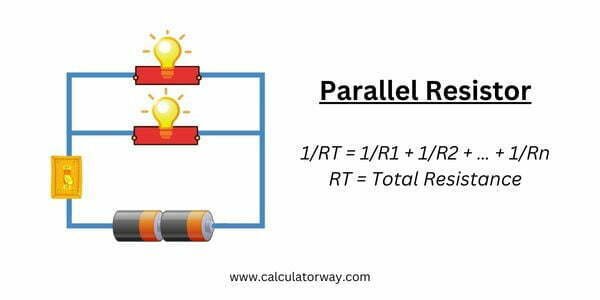Free online parallel resistor calculator – calculate the equivalent resistance of multiple resistors in parallel, enter all resistor values then click the calculate button
What is a Parallel Resistor?
A parallel resistor is a type of electrical circuit in which two or more resistors are connected side-by-side, with each resistor having its own path for the flow of electric current.
In a parallel resistor circuit, the total resistance is less than the value of the smallest resistor in the circuit, because the current can flow through multiple paths instead of just one.


Formula of Parallel Resistor
The formula to calculate the total resistance of a parallel resistor circuit is:
1/Rtotal = 1/R1 + 1/R2 + 1/R3 + … + 1/Rn
- Rtotal = total resistance of the circuit
- R1, R2, R3, and Rn = individual resistances of each resistor in the circuit.
How to Calculate Parallel Resistors?
Example:– 150Ω, 250Ω, and 300Ω resistors are connected in parallel then calculate equivalent/total resistance.
1/Rtotal = 1/R1 + 1/R2 + 1/R3 + … + 1/Rn
1/Rtotal = 1/R1 + 1/R2 + 1/R3
Rtotal = 1/150 + 1/250 + 1/300
Rtotal = 71.4285Ω
Total Resistance = 71.4285Ω
More Calculator
Reference:-
Read more about parallel resistors:- visit website